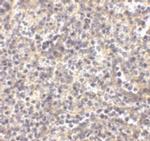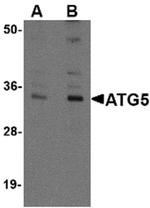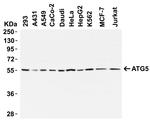Search Thermo Fisher Scientific
FIGURE: 1 / 3
ATG5 Antibody (PA5-20688) in IHC (P)



Product Details
PA5-20688
Species Reactivity
Host/Isotype
Class
Type
Immunogen
Conjugate
Form
Concentration
Purification
Storage buffer
Contains
Storage conditions
Shipping conditions
RRID
Product Specific Information
A suggested positive control is mouse spleen tissue lysate.
The PA5-20688 immunogen is located within the first 50 amino acids of ATG5.
Predicted molecular ~ 32kD. In Western blot applications, this antibody has been observed to detect a band at: 55kD (ATG5-ATG12 conjugation).
Predicted species reactivity based on immunogen sequence: Rat (100%), Bovine: (94%), Pig: (94%).
Target Information
ATG5 (Autophagy Related 5) is an important element for autophagy and may play an important role in the apoptotic process. ATG5 is also involved in other cellular processes that include mitochondrial quality control after oxidative damage, negative regulation of the innate anti-viral immune response, lymphocyte development and proliferation, MHC II antigen presentation, and adipocyte differentiation. Following conjugation to ATG12, the conjugate participates in the formation of autophagosome. ATG5 contributes to autophagic cell death by interacting with Fas-associated protein with death domain (FADD). The ATG5-ATG12 conjugate forms a cup-shaped isolation membrane that then detaches from the membrane immediately before or after autophagosome formation is completed. APG5 may play a role in the apoptotic process, possibly within the modified cytoskeleton. Further, APG5 expression is a relatively late event in the apoptotic process, occurring downstream of caspase activity. The APG5-APG12 conjugate also associates with innate immune response proteins such as RIG-I and VISA (also known as IPS-1), inhibiting type I interferon production and permitting viral replication in host cells. Diseases associated with ATG5 dysfunction include spinocerebellar ataxia.
For Research Use Only. Not for use in diagnostic procedures. Not for resale without express authorization.
References (0)
Bioinformatics
Protein Aliases: APG 5; APG5 autophagy 5 like (APG5L); APG5-like; Apoptosis-specific protein; Apoptosis-specific protein (ASP); ATG5 autophagy related 5 homolog; Autophagy protein 5; autophagy-related 5
Gene Aliases: 2010107M05Rik; 3110067M24Rik; APG5; APG5-LIKE; APG5L; ASP; ATG5; Atg5l; AW319544; C88337; hAPG5; Paddy
UniProt ID: (Human) Q9H1Y0, (Mouse) Q99J83
Entrez Gene ID: (Human) 9474, (Mouse) 11793

Performance Guarantee
If an Invitrogen™ antibody doesn't perform as described on our website or datasheet,we'll replace the product at no cost to you, or provide you with a credit for a future purchase.*
Learn more
We're here to help
Get expert recommendations for common problems or connect directly with an on staff expert for technical assistance related to applications, equipment and general product use.
Contact tech support
